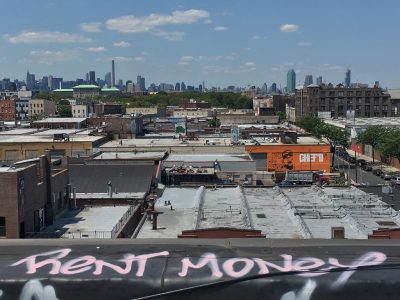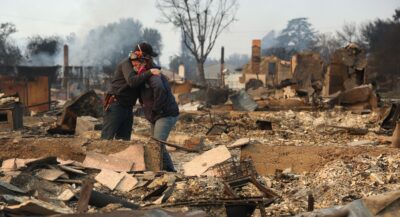The Golden Door: You Carry Your Father’s Face
My father, who had a degree in engineering in Bosnia, now works as a doorman. I remember going on a walk with him around Morris Park in the Bronx when I was 18 years old. He stopped and said to me, “I do a job that I do not love, in a country that does not understand me, but I do it all for you. I might not have a lot of money, but at least my children are my wealth.” You can imagine the fear of disappointing him.
As a Bosnian-American Muslim woman, my entire childhood was a reminder of the great sacrifices that my parents made to come to this country. I heard stories of refugee camps, of not knowing the fate of lost friends and loved ones, of darting through sniper ridden streets just to get another meal. It was difficult to process at a young age, but it instilled in me a great pride to have come from such a powerful line of survivors. My mother would always tell me, “When you do something out there, you carry your father’s face.” It was her way of reminding me that, like the collectivist culture she grew up in, my actions would forever impact our reputation in the community, and there are few things in this world more important to a Bosnian family than reputation.
After September 11, my family urged me not to reveal my background to strangers—wary that preconceptions would cause them to harm me. When I heard this I was very confused. I was barely seven. Why would anyone be afraid of me?
I was in the second grade when the Twin Towers fell. My mother showed up to my class to pick me up. All the parents were frantic, calling relatives and friends who might have been working in Manhattan that day. Without even telling me, I knew by her tone that something bad had happened. Suddenly, it did not matter that so many Muslim families had been in this country for decades, that so many Muslims were already hard-working citizens and members of American society. I think that night every Muslim mother and father must have sat down with their children and told them about what to expect in a post-9/11 world.
So when President Trump first mentioned during the election that he would instate a ban on Muslims, we believed him. Years of Quran burnings and pig heads left on mosque doorsteps all around the United States pointed us to this moment. Trump signed this order under the pretense that this would prevent terrorists and ‘“dangerous people” from entering our country. But his logic is flawed: instead, he is leaving behind innocent mothers, fathers, and children. None of the 9/11 attackers were from the seven Muslim majority countries he included in the executive order. President Trump did, however, conveniently ignore those countries where the attackers originated, countries he has businesses in.
With this order, Trump implies that all Muslims have the potential to become terrorists. It is heartbreaking to watch Muslim refugees being denied the opportunities my parents were so lucky to grab hold of. There is a huge misunderstanding of what a person has to go through to get into this country in the first place: the months or years of applications and proving to strangers that you are a good person, that you are deserving of a right to live.
When my parents first came to America, swaddling me—a then two-month-old infant—they were met by relatives at JFK airport with the promise of opportunity. Like many other refugees, they too were overwhelmed by a looming uncertainty of what was expected from people here. Simple things like how to talk and how to act had to be relearned in a language unknown to them, using words that tripped the tongue like cotton in the mouth. They were confronted with things like personal space, a custom that does not exist to the Bosnian people. Even the minor taboo behind kissing platonic loved ones on the cheek (I could never tell if it was three times or two) came as a shock, but they worked hard to abide by these unwritten rules outside of family. The culture I grew up in at home is loud and foreign and full of Turkish coffee, Bosnian folk music, and kofte. But when I went to school, I felt like a different person. For a long time I resented feeling that I had to live two different lives, that my parents did not understand my desire to take part in what was considered “normal” American kid activities, like sleep-away camp and after-school clubs.
I failed to realize how difficult my parents worked to assimilate and overcome their noticeable differences. Teaching yourself to suppress basic day-to-day habits that come natural to you is no easy task. And when immigrants who do not fit American culture’s expected molds, they often attempt to make themselves invisible, when it is their very uniqueness that brings so much color and joy to American society. But invisibility sometimes feels necessary when it’s your safety at risk.
It’s more important now than ever to show up and speak out against injustice, even when the struggle might not be my own. I show up because being a Muslim Bosnian-American is my identity, one that I am wildly proud of. I show up because I carry my father’s face.
You might also like 



















